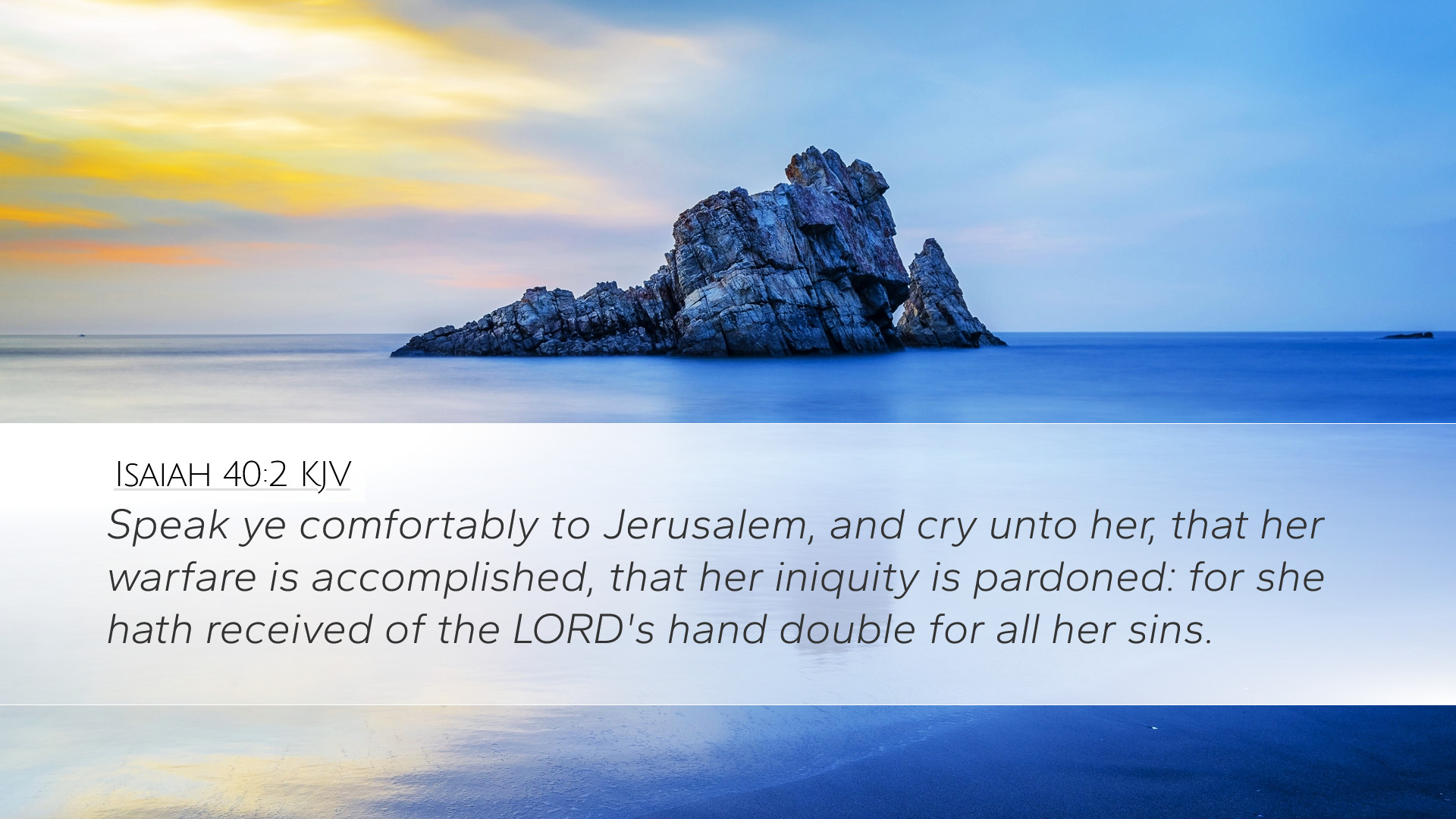Commentary on Isaiah 40:2
Isaiah 40:2 reads: “Speak ye comfortably to Jerusalem, and cry unto her, that her warfare is accomplished, that her iniquity is pardoned: for she hath received of the Lord’s hand double for all her sins.” This verse serves as a pivotal expression of hope and restoration for Israel and holds profound theological implications.
Contextual Background
This passage occurs in a section of Isaiah known for its themes of comfort and deliverance, particularly directed towards exiled Israel. The prophet Isaiah, amidst a promise of judgment, offers solace to the suffering people, indicating a transition from lament to restoration.
Exegetical Insights
Several significant elements from the commentaries illuminate the depth of this verse:
-
Comfort and Assurance
Matthew Henry emphasizes the command to "speak comfortably" as a directive to instill hope rather than despair. The 'comfort' signifies not merely consolation but a profound assurance that God's favor is returning to His people.
-
Completion of Warfare
Albert Barnes highlights the phrase "her warfare is accomplished" as the end of Israel's suffering. This reflects a dual notion: the cessation of conflict and the fulfillment of divine judgment. No longer are they engaged in a struggle for survival; instead, they can anticipate peace.
-
Pardoning of Iniquity
Adam Clarke notes that “her iniquity is pardoned” signifies God’s grace toward the repentant. This statement underscores the nature of divine forgiveness—an essential aspect of God's relationship with His people, reinforcing the message that genuine repentance brings restoration.
-
Double for All Her Sins
This phrase has been interpreted variably, yet Matthew Henry connects it to the idea of compensation. The 'double' indicates a fullness of blessing that exceeds the punishment they endured, evoking the principle of divine generosity in restoring what was lost.
Theological Implications
This verse speaks profoundly to the themes of sin, judgment, and restoration in Christian theology:
-
Nature of God’s Judgment
The assurance of forgiveness establishes a crucial balance between justice and mercy. God does not overlook sin but rather addresses it fully, ensuring that His people understand the consequences of iniquity while simultaneously revealing His compassion.
-
Messianic Hope
Many scholars, including Barnes, point out the eschatological implications of this text. It foreshadows the coming Christ, who ultimately addresses humanity's sin and offers reconciliation with God, a fulfillment of the promise of comfort and redemption.
-
Encouragement for Today’s Believers
The message of Isaiah 40:2 resonates profoundly in contemporary faith contexts. The church today can draw encouragement from the assurance of God’s presence and the promise of restoration, offering a model for how to respond to a world often marked by pain and distress.
Pastoral Application
This verse offers vital insights for pastoral ministry by encouraging leaders to embody a message of hope:
-
Speaking of Comfort
Pastors are called to remind their congregations of God's grace and promise of restoration. This requires a careful balance of confronting sin while providing assurance of God’s pardon.
-
Encouraging Repentance
Just as Israel was urged to recognize their sin, the church should foster an environment where confession and repentance are encouraged, leading to forgiveness and communal healing.
-
Proclaiming the Gospel
The essence of Isaiah 40:2 ties directly into the Great Commission, as pastors are tasked with heralding the good news of Jesus Christ—the ultimate fulfillment of this promise of comfort and redemption.
Conclusion
In summary, Isaiah 40:2 embodies a profound message of comfort, reconciliation, and divine promise. The insights gained from public domain commentaries allow readers to appreciate its rich theological significance and applicability in the lives of both ancient and modern believers. As we reflect on this verse, we are reminded of God's unwavering commitment to comfort and restore His people, a theme that echoes throughout Scripture.


